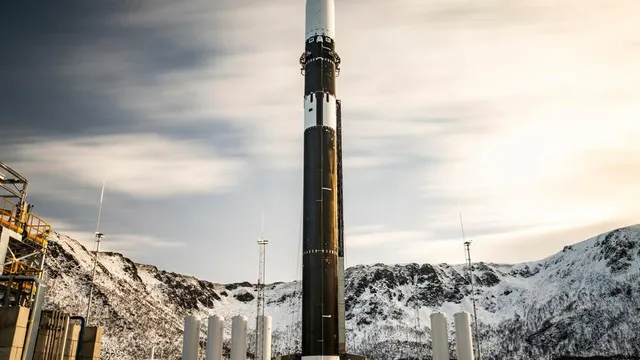
Isar Aerospace records milestone with Spectrum rocket test flight success
2025-03-30 12:13- The unmanned Spectrum rocket was developed by Isar Aerospace and launched from Norway's Andoya Spaceport.
- The rocket exploded 40 seconds after liftoff, but the company declared the test a success based on data collected.
- This launch marked a significant step for private sector involvement in the European space industry.
Express your sentiment!
Insights
On Sunday, March 29, 2025, a test rocket intended for satellite launches exploded shortly after takeoff from a spaceport in Norway. The Spectrum rocket, developed by the German start-up Isar Aerospace, crashed and exploded 40 seconds post-launch. However, Isar Aerospace hailed the test as a success, highlighting that the initial phase of the rocket’s flight achieved critical milestones despite the loss of the vehicle. The launch took place at Andoya Spaceport, marking a significant venture in Europe's space industry, as this was the first orbital launch attempt from the continent, excluding Russia. The unmanned Spectrum rocket measures 92 feet and is a two-stage vehicle developed to place payloads like satellites into Earth's orbit or beyond. Prior to this launch, Isar Aerospace had managed expectations, stating that reaching orbit was not anticipated for this initial test. This approach allowed the team to focus on collecting valuable data and improving their technology. Daniel Metzler, Isar Aerospace's chief executive, expressed satisfaction with the rocket's performance, noting that even a 30-second flight was a significant achievement for the company's objectives. Isar Aerospace, unlike the European Space Agency (ESA), operates independently and focuses mainly on private funding. Typically, ESA has conducted its launches from locations like French Guiana and Cape Canaveral in Florida. The Spectrum flight represents a landmark event in the European space industry, which has faced numerous challenges, including postponed launches due to inclement weather conditions. Notably, Europe's first orbital launch attempt was made by Virgin Orbit in 2023, which ended in failure yet drew significant media attention. Despite the explosion, industry experts and Isar Aerospace remain optimistic, suggesting that the data collected from this test could contribute to future successful rocket launches. The favorable weather conditions on the day allowed the rocket to launch without delays related to atmospheric concerns. Despite its failure to complete the mission as intended, the event was broadly considered a learning opportunity and demonstrates ongoing efforts to establish an independent European presence in the satellite launch market.
Contexts
The satellite launch industry in Europe has seen significant advancements and transformations over the past decade, driven by both technological innovation and the increasing demand for satellite services. Europe is home to key players in the space sector, including the European Space Agency (ESA), which plays a crucial role in coordinating efforts among its member states to promote European interests in space exploration and satellite launches. Additionally, companies like Arianespace and the emerging Rocket Factory Augsburg (RFA) are instrumental in enhancing Europe's launch capabilities, offering a range of services from small satellite launches to heavier payloads. As countries and companies look to maximize their share in this growing market, they are investing in developing more cost-effective and versatile launch systems, which is reshaping the competitive landscape across the globe. One of the primary factors driving growth in the European satellite launch industry is the rising demand for satellite applications, including telecommunications, Earth observation, and scientific research. As more nations and private enterprises recognize the importance of satellite technology for data collection and connectivity, the volume of satellite launches has grown substantially. This surge in demand has generated opportunities for European companies, ensuring that they remain competitive in the face of challenges from other regions, especially the United States and China. The European Union's commitment to investing in space initiatives and fostering partnerships with the private sector also plays a vital role in sustaining this growth trajectory. Moreover, the industry faces challenges such as regulatory hurdles, the need for sustainable practices, and developing launch vehicles that can handle the evolving needs of satellite operators. Emphasizing environmental concerns, Europe has been proactive in addressing the implications of space debris and the environmental impact of launches. Initiatives like the European Union's Space Strategy aim to mitigate these challenges by promoting responsible practices across the industry. Furthermore, innovations, including reusable launch systems, are being explored to ensure that Europe's satellite launch services meet the demands of a rapidly changing global landscape while prioritizing sustainability and cost-efficiency. In conclusion, the future of the satellite launch industry in Europe is poised for growth and modernization. With strong governmental backing, strategic partnerships, and an emphasis on innovation, Europe is well-positioned to navigate the complexities of the global space market. The upcoming years will likely witness further collaboration between public agencies and private companies, leading to enhanced capabilities in satellite launch services and the potential for new breakthroughs in space exploration and technology.